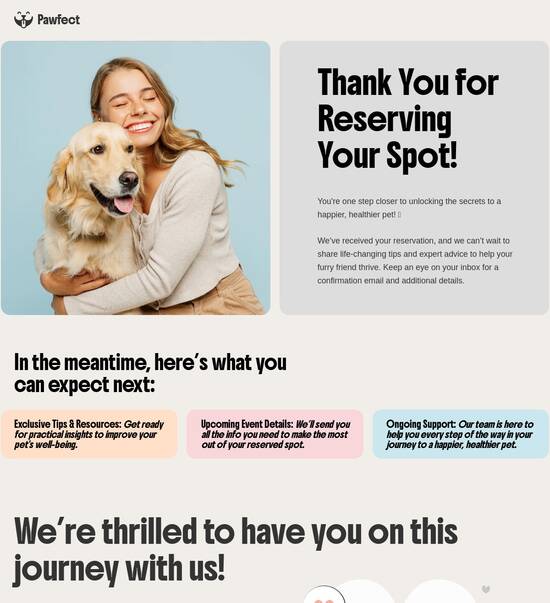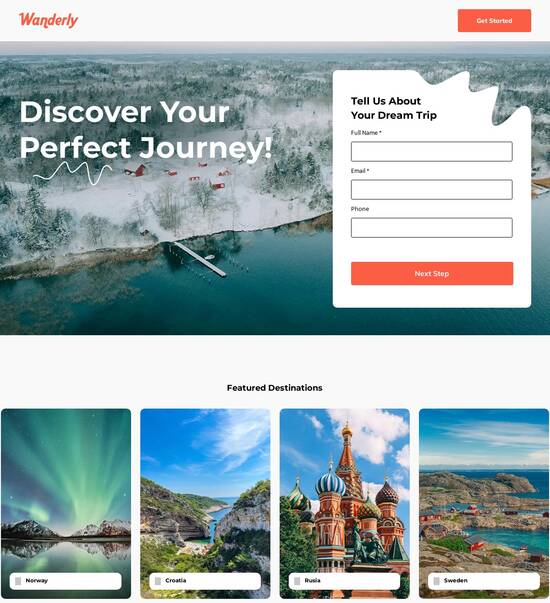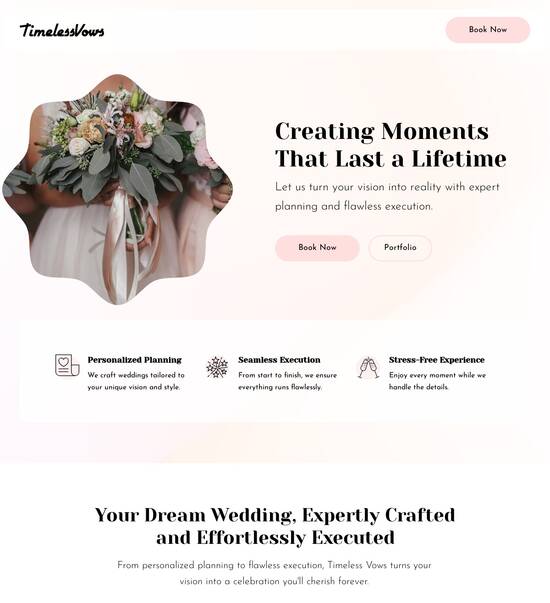
Conversion optimized product page templates
Use TemplateAbout template
Use conversion optimized product page templates and stay true to your brand identity. Resonate with your audience today.
Recommended templates

Easy to build without coding
With the intuitive drag-and-drop builder, anyone on your team can create high-converting pages without any knowledge of code or design. Make enhancements to your landing page with custom widgets using Javascript, HTML/CSS, or third-party scripts.

Multiple layouts for any industry and goal
Select from 500+ landing page layouts built to boost conversions across industry-specific scenarios. Customize them by adjusting fonts, adding images, and generating on-brand content with the AI assistant. Quickly scale with Instablocks® and Global Blocks that you can save, reuse, and update globally.

Loads fast and looks polished on any device
Every template is responsive, which means they present professionally on any device and load blazingly fast with our Thor Render Engine. You can also power them up with Google AMP technology to deliver an unparalleled mobile experience and drive higher conversions.

Robust analytics & experimentation
Get real-time updates and reporting across all your devices, showing the number of visitors, conversions, cost-per-visitor, and cost-per-lead. Launch AI-powered experiments, run A/B tests, and use heatmaps to analyze user behavior, then optimize your landing page to maximize conversions.







Easy to build without coding
With the intuitive drag-and-drop builder, anyone on your team can create high-converting pages without any knowledge of code or design. Make enhancements to your landing page with custom widgets using Javascript, HTML/CSS, or third-party scripts.
Multiple layouts for any industry and goal
Select from 500+ landing page layouts built to boost conversions across industry-specific scenarios. Customize them by adjusting fonts, adding images, and generating on-brand content with the AI assistant. Quickly scale with Instablocks® and Global Blocks that you can save, reuse, and update globally.
Loads fast and looks polished on any device
Every template is responsive, which means they present professionally on any device and load blazingly fast with our Thor Render Engine.
Robust analytics & experimentation
Get real-time updates and reporting across all your devices, showing the number of visitors, conversions, cost-per-visitor, and cost-per-lead. Launch AI-powered experiments, run A/B tests, and use heatmaps to analyze user behavior, then optimize your landing page to maximize conversions.
All the features you need to build lead-generating landing pages
Explore more featuresLearn how to build top-performing landing pages for any goal
FAQs
Leading the way in building high-performing landing pages





A comprehensive guide to conversion optimized product page template with Instapage
Creating an effective conversion optimized product page template is crucial for increasing your ROI and optimizing your digital marketing campaigns. Instapage offers powerful tools specifically designed for marketers in various sectors such as tech, education, and financial services, enabling them to enhance their campaigns without the need for extensive resources or expertise.
Understanding the importance of a conversion optimized product page template
A conversion optimized product page template plays a vital role in guiding visitors to make informed purchasing decisions. With Instapage, you can leverage customizable templates tailored for high conversion rates, ensuring your pages resonate with your target audience. Learn how Instapage's features can significantly boost your page effectiveness:
- User-friendly design: Easily customizable templates that allow non-developers to craft professional-looking pages.
- High conversion focus: Built with best practices in mind to maximize user engagement and lead generation.
- Integrated analytics tools: Understand customer behavior with detailed performance metrics across your campaigns.
Step 1: Choose the right template
The first step in creating a successful conversion optimized product page is selecting a template that aligns with your brand's identity and marketing goals. Instapage offers an extensive library of over 100 conversion-focused templates which can be easily tailored to match your specific needs.
Step 2: Tailor your content for your audience
Once you've selected a template, the next phase is content personalization. You want your product page to speak directly to your target audience. This is how you can optimize your content:
- Dynamic text replacement: Automatically customize page text based on visitor demographics.
- Audience segmentation: Deliver tailored experiences that relate to specific audiences or marketing campaigns.
- Visual storytelling: Use images and videos that connect emotionally, leading to higher engagement rates.
Step 3: Leverage optimization tools for improvements
Instapage includes numerous optimization tools that help continually improve your conversion rates. These are some of the methods you can use:
- A/B testing: Experiment with different designs, layouts, and CTAs to see what resonates most with your visitors.
- Heatmaps: Visualize user interactions on your page to identify areas needing refinement.
- Analytics dashboard: Access easy-to-read metrics which show the effectiveness of each page in real-time.
By utilizing these steps, marketers can significantly enhance the effectiveness of their conversion optimized product page template. Instapage equips you with all necessary tools to facilitate this process efficiently.
Get started with Instapage today and discover how you can create high-converting landing pages that generate leads and drive sales. Don’t let your marketing campaigns underperform—maximize your ROI with our powerful platform.
People also ask about Conversion optimized product page template
Conversion optimized product page template
Understanding the essence of a conversion optimized product page
In the world of e-commerce, product pages serve as the crucial interface between consumers and the products or services they seek. They are often the final touchpoint for potential buyers before making a purchase decision. An effective product page not only showcases the product but also persuades visitors to convert, which means turning browsers into buyers. This transformation isn't coincidental; it requires a thoughtful design that considers every aspect of user engagement and motivation.
The importance of product pages cannot be overstated. They play a significant role in shaping visitors' behavior, as they contain all essential information about a product. Factors such as the layout, messaging, images, and overall user experience can drastically influence decision-making. If executed properly, a conversion optimized product page can reduce bounce rates, increase customer satisfaction, and ultimately, drive sales.
Key elements of high-performing product page templates
Engaging product photography
High-quality visuals are indispensable when it comes to engaging potential buyers. Product photography not only attracts customers but also builds trust in the brand and the product. The principle is straightforward: the more appealing the visual representation of a product, the more likely customers are to feel comfortable making a purchase. Techniques such as appropriate lighting, various angles, and suitable backgrounds can enhance product images significantly.
Consider showcasing products in different contexts or uses, allowing the customer to visualize how the product fits into their life. For instance, displaying clothing on live models demonstrates fit and drape, while showcasing electronics in a user-friendly environment can highlight functionality. Brands should draw inspiration from companies like Apple, whose minimalist yet striking product images often lead to increased engagement and higher sales.
Persuasive product descriptions
A product’s story often has a more profound impact than mere specifications. Crafting compelling narratives helps create an emotional connection between the customer and the product. Effective product descriptions should detail features, articulate benefits, and weave storytelling elements that resonate with potential buyers. Describe how a product can improve the user's life or solve a specific problem they might encounter.
Don't forget to optimize descriptions for search engines. Incorporating relevant keywords while maintaining natural readability is essential. For instance, if you are selling eco-friendly kitchen utensils, consider using terms like 'sustainable cooking tools' or 'biodegradable kitchenware' within the descriptions. This strategy will help increase visibility in search results while attracting the right audience.
Strategically placed call-to-action buttons
Placement and design of call-to-action (CTA) buttons are vital for driving conversions. These buttons should be not only clear and prominent but placed intuitively on the product page. The primary action—like 'Add to Cart' or 'Buy Now'—should stand out visually, guiding users seamlessly toward making a purchase.
Best practices for CTA design include using contrasting colors, ensuring adequate size for touch navigation, and placing them above the fold. Successful brands often utilize CTAs creatively, such as incorporating engaging phrases like 'Get Yours Now' or 'Start Your Adventure.' These small tweaks can significantly boost click-through rates and conversions.
Enhancing user experience through design
Streamlined layout and navigation
A streamlined and intuitive layout is key to improving user experience. Cluttered pages can lead to frustration and drive potential buyers away. A well-organized product page should clearly communicate information through intuitive navigation, guiding users through features, images, and descriptions smoothly. Consider using categories or tabs for multi-functional products, ensuring that users are never overwhelmed.
Moreover, mobile optimization is critical. As more shoppers use smartphones and tablets, having a mobile-responsive design that adjusts content and layouts is non-negotiable. Google also prioritizes mobile-friendly designs in search rankings, meaning optimizing product pages for various devices can support visibility and customer satisfaction.
Incorporating customer reviews and social proof
Customer reviews are an invaluable resource for boosting conversions. Testimonials and ratings serve as social proof, influencing the purchasing decisions of prospective buyers. Displaying these reviews prominently on product pages can help alleviate concerns and build trust. Even negative feedback can be beneficial if addressed appropriately.
Creative ways of showcasing reviews include summarizing ratings at the top of the page, allowing user-generated content like photos, or integrating a dedicated review section. An analysis of buyer psychology shows that consumers often look for reassurance in friendships and shared experiences. This information helps to craft an effective product page that acknowledges the importance of customer voice, enhancing both credibility and attractiveness.
The science of conversion rate optimization
A/B testing for continuous improvement
A/B testing is an essential technique that allows marketers to determine which elements of a product page resonate best with customers. By testing two versions of a page—whether it's a different header, image, or layout—marketers can gather valuable insights into viewer preferences. This method removes guesswork, providing a clear path for optimization based on real user data.
When conducting A/B tests, it's crucial to focus on various elements, such as button placements, image quality, or product descriptions. By systematically analyzing which changes drive the best conversion rates, brands can refine their product pages over time. Evaluate results using metrics, and don't hesitate to revisit your strategies, creating a culture of ongoing assessment and refining to stay relevant.
Utilizing analytics to drive decisions
Data analytics is another cornerstone of optimizing product pages effectively. Understanding metrics such as bounce rate and time spent on the page can reveal a wealth of information about user interactions. Specialized tools can track visitor behavior, offering insights into how potential customers navigate the product page.
By leveraging this data, marketers can make informed adjustments to enhance performance. For instance, if analytics indicate customers are abandoning the page swiftly, it might signal layout issues, rapid loading times, or content that's not resonating with the audience. Harnessing the power of analytics leads not only to incremental improvements but can redefine overall strategy.
Crafting a personalized shopping experience
Tailoring pages based on customer segments
Recognizing the diverse needs of different customer segments is integral to crafting a personalized product page. User behavior and preferences can vary significantly, and tailoring pages accordingly can enhance customer engagement and satisfaction. Adjusting elements such as products recommended, visuals displayed, or even messaging based on user demographics can leave a significant impact on conversion rates.
Implementing tactics like dynamic content, which changes based on who views the page, ensures that each customer receives relevant information. Personalization may boost satisfaction while taking less effort on buyers' parts, making them more likely to return for future purchases.
Engaging customers through interactive elements
Incorporating interactive elements can significantly increase customer engagement. Features such as 360-degree product views, videos that demonstrate product usage, or customizable options allow for a rewarding customer experience. These elements provide a tactile sense of connection, making users more inclined to explore further and eventually make a purchase.
Case studies show that brands integrating interactive features not only enhance user interaction but also achieve better retention rates. When customers can actively engage with products, it dispels uncertainty—allowing them to feel more confident in their purchase decisions.
Benefits of optimization for manufacturers and brands
Increased sales and revenue
Optimized product pages have a direct correlation with increased sales and revenue. Numerous studies indicate that employing conversion strategies can lead to significant growth in conversion rates—often doubling sales for brands who have applied effective optimization techniques. This ensures that a well-designed product page is not just visual appeal, but a necessary financial driver for e-commerce.
Real-world examples abound, with brands sharing statistics on revenue growth post-optimization. For example, an apparel brand improved their conversion rates by 30% through image enhancements and a more descriptive approach to product benefits. Such strategies prove that investing in product page optimizations pays off in tangible financial results.
Building brand loyalty through effective solutions
Optimized product pages extend beyond immediate sales; they also contribute to long-term brand loyalty. Customers who have fulfilling experiences with product pages are more likely to develop a favorable view of the brand. Consistently well-designed pages can foster a sense of trust, reinforcing a brand’s identity through consistent use of color palettes, typography, and imagery.
As consumers continuously return to brands they trust, optimizing product pages becomes an avenue for not just sales but community building. By creating pages that also reflect their core values and aesthetics, brands can deepen relationships with their audience, securing loyalty in fiercely competitive markets.
Future trends in product page optimization
Emerging technologies and their impact
As technology evolves, so do strategies for product page optimization. Emerging trends pose exciting opportunities, particularly the role of AI and machine learning in creating personalized shopping experiences. As algorithms become more sophisticated, they can seamlessly analyze user behavior, predicting needs and preferences with greater accuracy than ever before.
Additionally, augmented reality (AR) is set to overhaul traditional shopping methods by allowing customers to visualize products in their own environments before making purchases. This advancement encourages thoughtful decision-making and reduces potential satisfaction issues after purchase, marking a significant shift in online shopping paradigms.
Challenges and opportunities in evolving product page strategies
While these trends offer exciting pathways, they also come with a set of challenges. Businesses must stay abreast of shifting technology landscapes while ensuring that product pages remain user-friendly and relevant. Continuous research and adaptation will be integral for businesses aiming to lead in product page optimization.
Conversely, the demand for seamless online experiences translates into unparalleled opportunities for those who are willing to adapt. By investing in the latest technologies and testing innovative strategies, brands can harness their full potential to connect with customers and enhance overall product page performance.
Conclusion: The journey to a high-converting product page
Building a high-converting product page is not a one-time effort; it requires dedication to continual refinement and learning. As the e-commerce landscape evolves, so too should the strategies employed to optimize product pages. Regular updates based on market trends, customer feedback, and technological advancements can keep product pages engaging and effective.
Emphasizing a culture of optimization within e-commerce teams will lead to sustained performance improvements. Companies willing to invest in the long-term benefits of conversion optimization will ultimately stand out in an ever-competitive online marketplace. The future of product pages and engaging customers lies in strategic planning, consistent execution, and an unwavering commitment to improvement.
Ready to skyrocket conversions?
Supercharge your ad campaigns with high-performing landing pages
Get started














